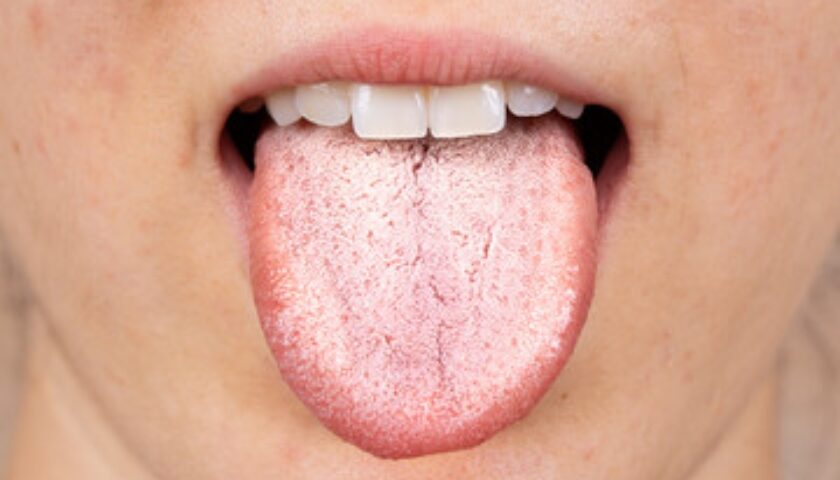White Tongue and Bad Breath: Causes and Treatment

Foods That Cause Bad Breath
December 4, 2023
Can Wisdom Teeth Grow Back After Extraction?
December 14, 2023The development of a white coating on either a portion or the entire top surface of the tongue characterizes the white tongue. This condition may be accompanied by unpleasant breath, a tongue with a hairy appearance, and irritation. Although the coated tongue is aesthetically displeasing, it is typically benign and short-lived. If the condition persists for more than a few weeks, or if you encounter pain or difficulties in eating and speaking, it is advisable to seek guidance from a healthcare professional.
What is white tongue?
Coated tongue is characterized by the presence of a thick white film covering the surface of the tongue. This coating may extend across the entire tongue, be limited to the back portion, or manifest in patches. While a white tongue may seem concerning, it typically indicates the accumulation of bacteria, debris (such as food and sugar), or dead cells on the tongue.
Coated tongue can occasionally coincide with another tongue-related issue known as black hairy tongue. In the case of a black hairy tongue, the accumulation of food particles, dead cells, and bacteria gives the tongue a dark and furry appearance instead of a white one.
Potential Causes
What causes a white tongue?
The development of a white film on your tongue may occur when bacteria and food particles, known as papillae, become trapped among the small bumps on the tongue’s surface. The raised nature of these papillae creates a sizable surface area where debris can accumulate within your mouth. Swelling and inflammation of the papillae may result, often leading to bad breath and an unpleasant taste.
Possible causes include:
- Poor oral hygiene (failure to regularly brush, floss, or clean your tongue).
- Tobacco use (smoking, vaping, dipping, or chewing).
- Regular consumption of more than one alcoholic beverage per day contributes to dehydration.
- Wearing dentures or causing damage to the tongue with sharp objects.
- Taking antibiotics, which can lead to a yeast infection in the mouth.
- Inadequate intake of fruits and vegetables and an excess of soft foods in the diet.
- Breathing through the mouth.
- Dry mouth resulting from a medical condition or the use of certain medications (such as muscle relaxers and specific cancer treatments).
A white tongue may be a symptom of various conditions, including:
Geographic tongue: Characterized by red patches on the tongue with white borders, more prevalent in individuals with eczema, psoriasis, Type 1 diabetes, or reactive arthritis.
Leukoplakia: Involving white patches or spots inside the mouth, potentially caused by chewing tobacco, heavy smoking, or excessive alcohol consumption.
Oral lichen planus: A chronic inflammatory mouth condition leading to white patches on the inner cheeks, gums, and tongue, likely associated with immune system issues.
Oral thrush: An infection caused by the Candida yeast, becoming problematic when it grows excessively.
Syphilis: A sexually transmitted infection (STI) with various symptoms, including a white tongue.
While rare, a coated tongue can sometimes be a symptom of oral cancer. If persistent or concerning symptoms arise, seeking medical attention is recommended.
Care and Treatment
How is white tongue managed?
In numerous instances, the coated tongue typically resolves spontaneously within a few weeks without necessitating any specific treatment. Nevertheless, it may be prudent for individuals who desire a quicker resolution or if the condition persists beyond the usual timeframe to seek treatment. Dr. Olivia Cui, a dentist in Olds, AB, recommends that the white tongue can be effectively managed through appropriate treatment methods and implementing basic home remedies. The treatment approaches for coated tongue may differ based on the symptoms exhibited and the underlying causes.
Tongue Rash
Typically, rashes associated with coated tongue resolve without intervention. However, suppose a rash linked to oral lichen planus persists. In that case, healthcare providers may prescribe steroidal mouthwashes (consisting of steroid pills dissolved in water) and steroid sprays to alleviate symptoms such as burning or sore gums.
Infection
For fungal infections like oral thrush, antifungal medications such as fluconazole (Diflucan®) or nystatin (Nystop®) are commonly prescribed by healthcare providers.
In the case of coated tongue caused by syphilis, antibiotics (such as penicillin) are necessary to eliminate the bacteria.
White Patches
There is generally no cancer risk associated with the white patches of the geographic tongue. Treatment primarily focuses on managing symptoms, including avoiding foods and beverages that cause pain and utilizing antifungal treatments on the tongue to soothe discomfort.
In instances where there is a potential risk of patches turning cancerous, as seen in leukoplakia, healthcare providers may opt for removal. This can be achieved through methods such as using a scalpel, laser, or, infrequently, cryotherapy (freezing with liquid nitrogen). This proactive approach helps prevent the development of cancerous cells in the tongue.
Home Remedies for White Tongue
Most individuals can alleviate white tongue through consistent adherence to good oral hygiene practices and staying well-hydrated. Home remedies include:
- Drinking at least eight glasses of water daily.
- Brushing teeth with a soft toothbrush.
- Brush the tongue or use a tongue scraper to eliminate the white coating.
- Use mild fluoride toothpaste and mouthwash.
- Avoiding substances that expose the tongue to toxins, such as cigarettes and vape pens.
- Steering clear of irritating foods, including those that are spicy, salty, acidic, or very hot.
- Taking over-the-counter painkillers if the white tongue causes discomfort.
Complications and Risks of Untreated White Tongue
Without intervention, the accumulation of bacteria and debris on the tongue may lead to gum disease, with the potential for the infection to spread to other parts of the body. In cases of leukoplakia, untreated white patches can progress to oral cancer.
Preventing White Tongue
While it may not always be preventable, reducing the likelihood of developing a white tongue is possible through good oral hygiene practices. This includes regular dental checkups every six months, brushing teeth at least twice a day, daily flossing, and maintaining a healthy diet rich in fresh fruits and vegetables.
Individuals experiencing severe white tongue symptoms are advised to either quit or decrease their consumption of alcohol and tobacco. It is recommended to have regular check-ups with a dentist or healthcare professional to ensure consistent care and minimize the chances of white patches developing into cancerous conditions. Dr. Olivia Cui, a dentist in Olds, AB, employs various strategies to educate patients about the causes and treatment of coated tongue. Therefore, it is crucial to adhere to health and hygiene tips to maintain dental well-being and prevent white teeth.


